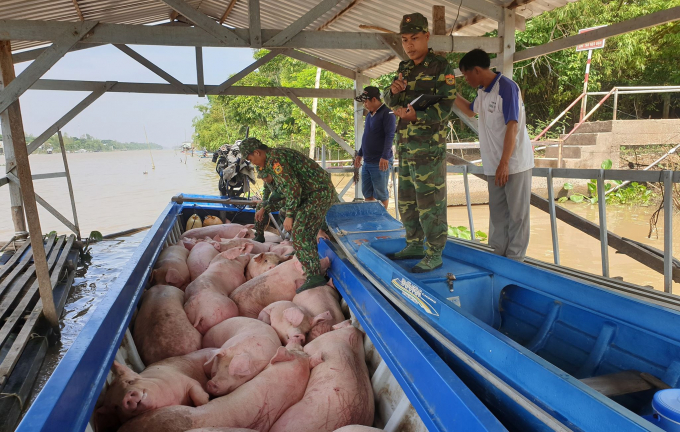June 17, 2025 | 10:14 GMT +7
June 17, 2025 | 10:14 GMT +7
Hotline: 0913.378.918
June 17, 2025 | 10:14 GMT +7
Hotline: 0913.378.918

A smuggling of pigs across Cambodia border was arrested by the border guards. Photo: L.T.
The Cambodian Ministry of Agriculture, Forestry and Fisheries on May 19th sent a document to the Cambodian border provinces, stating that outbreaks of African Swine Fever (ASF) has spread throughout the Asian nations.
In order to protect the country from ASF invasion, the Cambodian Ministry of Agriculture, Forestry and Fisheries asked the authorities of the Cambodian border provinces to prevent the illegal imports of live pigs, pork and pork products into the country.
It is forecasted that in the coming time, Cambodia will enhance inspection and control of unofficial import activities for live pigs, pork and pork products on the Cambodia-Vietnam border. Along with that, the Cambodian authorities will tighten quarantine for pork and pork products imported across land border gates with Vietnam.
The Ministry of Industry and Trade recommended that businesses and traders exporting live pigs, pork and pork products on the border with Cambodia should pay attention to exporting by official channels, meeting the requirements on hygiene and food safety as well as preparing all necessary permits for animal quarantine.
Cambodia' s demand for pork is about 7,000-8,000 pigs per day ( a pig weighs roughly 60kg). Meanwhile, the domestic supply can meet 6,000 pigs per day and it still needs to import over 1,000 pigs per day. To meet that demand, the Cambodian private traders have imported live pigs mainly from the neighboring countries such as Vietnam and Thailand.
The Cambodian traders mainly import live pigs and pork by unofficial channels in order to save time, reduce costs and to avoid applying for animal quarantine inspection certificates as required by the authorities in the two countries.
Translated by Mai Tham

(VAN) The UNESCO Global Geopark revalidation of Non nuoc Cao Bang and the transition to a two-tier administrative model are presently undergoing a pivotal moment in Cao Bang, the northernmost province of Vietnam.
/2025/06/13/5330-2-004539_953.jpg)
(VAN) Changing policy mindset and removing investment barriers are urgent requirements to open up new development space for enterprises in the agricultural sector.

(VAN) The areas include the restoration of five million hectares of marine ecosystems.

(VAN) Dr. Le Van Nguyen, Director of the Institute of E-Commerce Management (ECM), emphasizes the potential for green development through the cultivation of fruit trees, particularly in provinces such as Son La.

(VAN) VAAS and numerous Vietnamese enterprises have signed cooperation agreements with Japanese partners to promote agricultural technology and trade connectivity.
/2025/05/29/5625-12-214801_567.jpg)
(VAN) Provincial mergers in the Mekong Delta promise to streamline administration, expand inter-provincial raw material areas, and foster close linkages in agricultural value chains, benefiting both businesses and cooperatives.

(VAN) Merging Mekong Delta provinces contributes to the expansion of agricultural raw material areas, addressing previous constraints caused by provincial boundaries. Additionally, this expansion will reduce costs and strengthen linkages between businesses, cooperatives, and farmers.